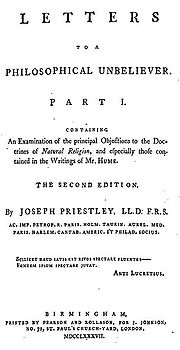
Letters to a Philosophical Unbeliever
Encyclopedia

Metaphysics
Metaphysics is a branch of philosophy concerned with explaining the fundamental nature of being and the world, although the term is not easily defined. Traditionally, metaphysics attempts to answer two basic questions in the broadest possible terms:...
by eighteenth-century British polymath
Polymath
A polymath is a person whose expertise spans a significant number of different subject areas. In less formal terms, a polymath may simply be someone who is very knowledgeable...
Joseph Priestley
Joseph Priestley
Joseph Priestley, FRS was an 18th-century English theologian, Dissenting clergyman, natural philosopher, chemist, educator, and political theorist who published over 150 works...
.
Priestley wrote a series of important metaphysics works during the years he spent serving as Lord Shelburne's
William Petty, 2nd Earl of Shelburne
William Petty-FitzMaurice, 1st Marquess of Lansdowne, KG, PC , known as The Earl of Shelburne between 1761 and 1784, by which title he is generally known to history, was an Irish-born British Whig statesman who was the first Home Secretary in 1782 and then Prime Minister 1782–1783 during the final...
assistant and companion. In a set of five works written during this time he argued for a materialist philosophy, even though such a position "entailed denial of free will and the soul."
As Shelburne's companion, Priestley had accompanied him on a tour of Europe in 1774; they spent quite a bit of time in Paris and the unsettling conversations Priestley had with the French philosophes there prompted him to write Letters to a Philosophical Unbeliever, the last of his series of major metaphysical works. Priestley recalled the trip in his Memoirs:
As I chose on all occasions to appear as a Christian, I was told by some of them [philosophes], that I was the only person they had ever met with, of whose understanding they had any opinion, who professed to believe Christianity. But on interrogating them on the subject, I soon found that they had given no proper attention to it, and did not really know what Christianity was ... Having conversed so much with unbelievers at home and abroad, I thought I should be able to combat their prejudices with some advantage, and with this view I wrote ... the first part of my ‘Letters to a Philosophical Unbeliever’, in proof of the doctrines of a God and a providence, and ... a second part, in defence of the evidences [sic] of Christianity.
In Letters, he continued to defend his thesis, begun in Disquisitions relating to Matter and Spirit
Disquisitions relating to Matter and Spirit
Disquisitions relating to Matter and Spirit is a major work of metaphysics written by eighteenth-century British polymath Joseph Priestley and published by Joseph Johnson....
and The Doctrine of Philosophical Necessity Illustrated
The Doctrine of Philosophical Necessity Illustrated
The Doctrine of Philosophical Necessity is one of the major metaphysical works of 18th-century British polymath Joseph Priestley.Between 1774 and 1778, while serving as an assistant to Lord Shelburne, Priestley wrote a series of five major metaphysical works, arguing for a materialist philosophy...
, that materialism and determinism can be reconciled with a belief in God. The text addresses those whose faith is shaped by books and fashion; Priestley draws an analogy between the skepticism of educated men and the credulity of the masses. He again argues for the existence of God using what Schofield calls "the classic argument from design ... leading from the necessary existence of a creator-designer to his self-comprehension, eternal existence, infinite power, omnipresence, and boundless benevolence."
In the three volumes, Priestley discusses, among many other works, Baron d'Holbach's
Baron d'Holbach
Paul-Henri Thiry, Baron d'Holbach was a French-German author, philosopher, encyclopedist and a prominent figure in the French Enlightenment. He was born Paul Heinrich Dietrich in Edesheim, near Landau in the Rhenish Palatinate, but lived and worked mainly in Paris, where he kept a salon...
Systeme de la Nature
The System of Nature
The System of Nature or, the Laws of the Moral and Physical World is a work of philosophy by Paul Henri Thiry, Baron d'Holbach . It was originally published under the name of Jean-Baptiste de Mirabaud, a deceased member of the French Academy of Science...
, often called the "bible of atheism
Atheism
Atheism is, in a broad sense, the rejection of belief in the existence of deities. In a narrower sense, atheism is specifically the position that there are no deities...
." He claimed that d'Holbach's "energy of nature," though it lacked intelligence or purpose, was really a description of God. Priestley believed that David Hume's
David Hume
David Hume was a Scottish philosopher, historian, economist, and essayist, known especially for his philosophical empiricism and skepticism. He was one of the most important figures in the history of Western philosophy and the Scottish Enlightenment...
style in the Dialogues Concerning Natural Religion
Dialogues Concerning Natural Religion
Dialogues Concerning Natural Religion is a philosophical work written by the Scottish philosopher David Hume. Through dialogue, three fictional characters named Demea, Philo, and Cleanthes debate the nature of God's existence...
(1779) was just as dangerous as its ideas; he feared the open-endedness of the Humean dialogue

